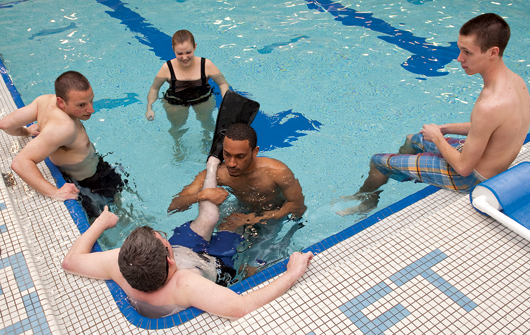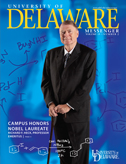
'Yes U Can'
ON THE GREEN | Vickie George was an outstanding athlete. She batted .500 in intercollegiate varsity softball at Temple University and went on to play women’s major league fast pitch. She also played basketball, field hockey and racquetball, and she hiked, biked and scuba dived.
Then, at age 39, she was diagnosed with multiple sclerosis (MS)—the progressive kind, where the symptoms worsen gradually and irreversibly. The kind that might make a person say, “No, I can’t.”
But Vickie George doesn’t like to say “I can’t,” so she and her founding partner, Debora Woolwine, started an organization called Yes U Can, a community-based, staff-assisted exercise program for people with disabilities that now includes an extension program at UD.
Students from the College of Health Sciences work with Yes U Can participants in the University pool, at other campus locations and at local fitness clubs.
Lauren Panchisan, a young woman who suffered a brain injury in an accident four years ago, spends three hours a week at Delaware Swim and Fitness Center working out under the guidance of UD student Melissa Kilker. In a typical session, the two warm up together on side-by-side stationary bikes, watching TV on the wall-mounted screens above them just like any other gym friends might do. Although she needed a wheelchair after the accident, Panchisan can now navigate with a walker.
David Kaplan, who has Parkinson’s disease, has been exercising at UD with the assistance of student Evan Snyder. “I’m thrilled with the program,” he says. “I tell Evan about the things that are bothering me, and he does some research to get ideas for things that I can experiment with to help with those problems.”
In return, Snyder says he has obtained insights into training and therapy that classroom work can’t provide. “This program is incredible,” he says. “It gives us the opportunity to work one-on-one with participants and gain rehab experience, and it gives them the opportunity to work out in a comfortable environment.”
And the benefits go beyond physical fitness. Dylan Thorne-Fitzgerald, who completed a practicum for the strength and conditioning minor through his work with Yes U Can, has created resistance training and stretching programs for two participants with MS. He says the program has improved the participants’ physical health as well as being “a very good social experience” for everyone involved.
“It’s very easy when you have a disability to just cocoon yourself in the house,” Carol Gajewski, who has MS and works with Thorne-Fitzgerald, says. “But with Dylan I’ve come to realize that I’m in capable hands. The fear is gone, and I get myself out every day and go somewhere.”
The roots of the program go back to 2002, when Steve Goodwin, associate professor of behavioral health and nutrition, invited George to be a guest lecturer in his health and physical education classes. She then began training Goodwin’s students to help her with exercise.
The Yes U Can Extension at UD was officially launched in 2010, with George working with Goodwin and Chris Knight, associate professor of kinesiology and applied physiology. The three also felt the time was right to expand the program to include students in majors other than exercise science and health and physical education.
“One of the most important things we can do in developing fitness programs for people with disabilities is to take a holistic approach,” Goodwin says. “Bringing in students from other areas has enabled us to provide additional services and expertise to Yes U Can participants while also offering this valuable experience to more students in the college.”
Article by Diane Kukich, AS ’73, ’84M





